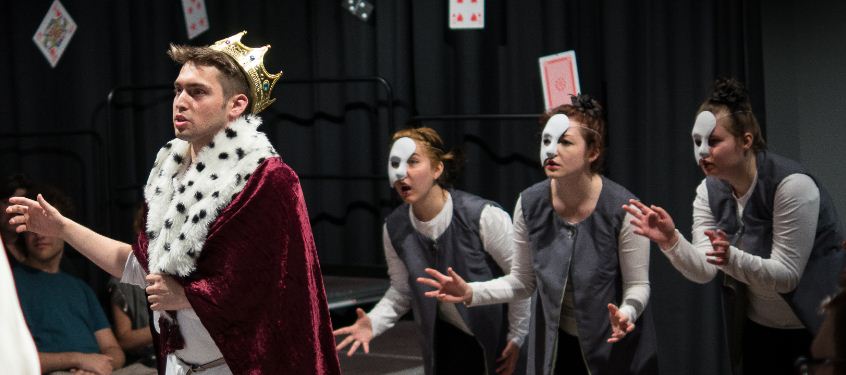
25/06/2014, by CLAS
Students impress in Russian play
In an earlier post, Olivia Hellewell reported on the preparations for this year’s Russian play, Golyi korol’ (The Naked King) by Evgenii Shwartz. Now, Cynthia Marsh, Emeritus Professor of Russian Drama and Literature, reviews the play, which was performed in the University of Nottingham’s Performing Arts Studio over three nights earlier this month (10-12 June 2014).
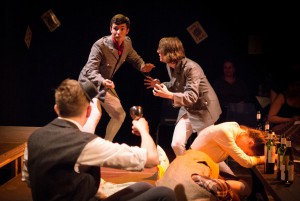 The Naked King is a satirical rewrite of the fairy tale by Hans Christian Andersen, The Emperor’s New Clothes, to respond to the politics of the Stalinist Russia in the early 1930s. It was not staged, though, until 1960. It was given a politically daring, highly theatricalised production at the Sovremennik (Contemporary) Theatre in Moscow, in post-Stalinist Russia when the rigours of Soviet cultural and political life finally began to yield. The late 50s and early 60s were labelled a ‘thaw’, at the time. The 1960 production poked provocative fun at the political hierarchy at the heart of Soviet Russian society.
The Naked King is a satirical rewrite of the fairy tale by Hans Christian Andersen, The Emperor’s New Clothes, to respond to the politics of the Stalinist Russia in the early 1930s. It was not staged, though, until 1960. It was given a politically daring, highly theatricalised production at the Sovremennik (Contemporary) Theatre in Moscow, in post-Stalinist Russia when the rigours of Soviet cultural and political life finally began to yield. The late 50s and early 60s were labelled a ‘thaw’, at the time. The 1960 production poked provocative fun at the political hierarchy at the heart of Soviet Russian society.
Chosen as this year’s play project in Russian and Slavonic Studies, The Naked King brought together undergrads and postgrads in a spirited production. The play is softened by a romantic framework borrowed from another fairy tale by Andersen, The Princess and the Swineherd: star-crossed lovers are eventually reunited, after the king has been duped into thinking the hero and his sidekick are tailors who can provide him with the best clothes in the world. The tension builds as the audience realises that the king will appear naked towards the end of the performance… or will he? His modesty was preserved by a bejewelled nappy, the amusing culmination to the production’s view of him as a childish monster.
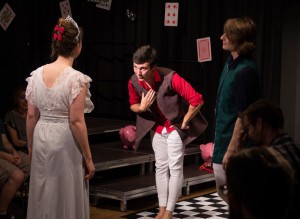 The use of space in the studio was inventive and alluring. A traverse set-up, with audience on both sides, was expanded by multi-level playing areas at each end. Hints of a chess game came in a black and white squared floor, as the characters manoeuvred for place in the power-driven, and ultimately very frightening, hierarchy. Large playing cards decorated the walls suggesting that in Russia in the 1930s and 60s life was a game of chance often at the mercy of king or leader.
The use of space in the studio was inventive and alluring. A traverse set-up, with audience on both sides, was expanded by multi-level playing areas at each end. Hints of a chess game came in a black and white squared floor, as the characters manoeuvred for place in the power-driven, and ultimately very frightening, hierarchy. Large playing cards decorated the walls suggesting that in Russia in the 1930s and 60s life was a game of chance often at the mercy of king or leader.
The play was conceived as a comedy, and this production brought out much of the laughter through some skilful exaggerated playing and caricature. In a most striking way this comic approach intensified the political horror of the period. But perhaps most impressive of all was the way the performers dealt with Shwartz’ none-too-easy text, full of contemporary reference and political double-entendres. Some of the performers are new to Russian language and culture, having come to the department as beginners only last September, and they delivered some impressive work. Others were second years whose confidence and maturing language skills were very evident.
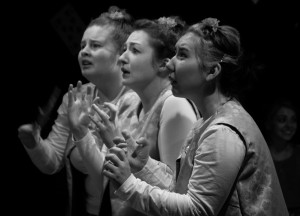 Very well done to the postgrad directing team (some of whom also performed) whose innovative concepts, attention to detail in the gestural and verbal language, and care with costumes (helped by one very generous Mum) and with props, all worked together to provide an introduction to Stalin’s Russia that was at once sombre and entertaining.
Very well done to the postgrad directing team (some of whom also performed) whose innovative concepts, attention to detail in the gestural and verbal language, and care with costumes (helped by one very generous Mum) and with props, all worked together to provide an introduction to Stalin’s Russia that was at once sombre and entertaining.
Using drama to develop language skills has a long and noble history in Russian culture, dating back to the 17th century. The reacquisition of Kiev from Catholic Poland in 1654 brought contact with western cultural tradition to a previously isolated Russia. The Jesuit seminary at Kiev was well established, and became a model for modernisation of Russian education, at that time located principally in the seminaries. Jesuit students of the classical languages would stage plays in the academic year to demonstrate and develop their linguistic expertise. As a result of the arrival of this model, the so-called Russian ‘School drama’ was born. The tradition became embedded in Orthodox seminaries, and student-priests would tour colloquial versions of Biblical tales, and plays adopted from the medieval Catholic mystery play tradition, to the countryside surrounding their various seminaries.
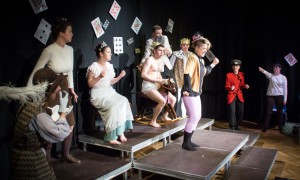 Contemporary infiltration of both plays and companies from Western Europe to Moscow, in particular, laid the foundations for the exceptionally powerful Russian theatre culture that followed. Russia returned those gifts in plenty to Europe from the late 19th century onwards, in dramatists and directors who are still revered today: Gogol, Turgenev, Chekhov, Gorky, Stanislavsky, Meyerhold, Mayakovsky and many more.
Contemporary infiltration of both plays and companies from Western Europe to Moscow, in particular, laid the foundations for the exceptionally powerful Russian theatre culture that followed. Russia returned those gifts in plenty to Europe from the late 19th century onwards, in dramatists and directors who are still revered today: Gogol, Turgenev, Chekhov, Gorky, Stanislavsky, Meyerhold, Mayakovsky and many more.
So, well done, Russian students at all levels! You certainly showed us your expertise. This fruitful collaboration between students and postgrads has produced an impressive and rich harvest indeed.
Cynthia Marsh
Emeritus Professor of Russian Drama and Literature
No comments yet, fill out a comment to be the first

Leave a Reply